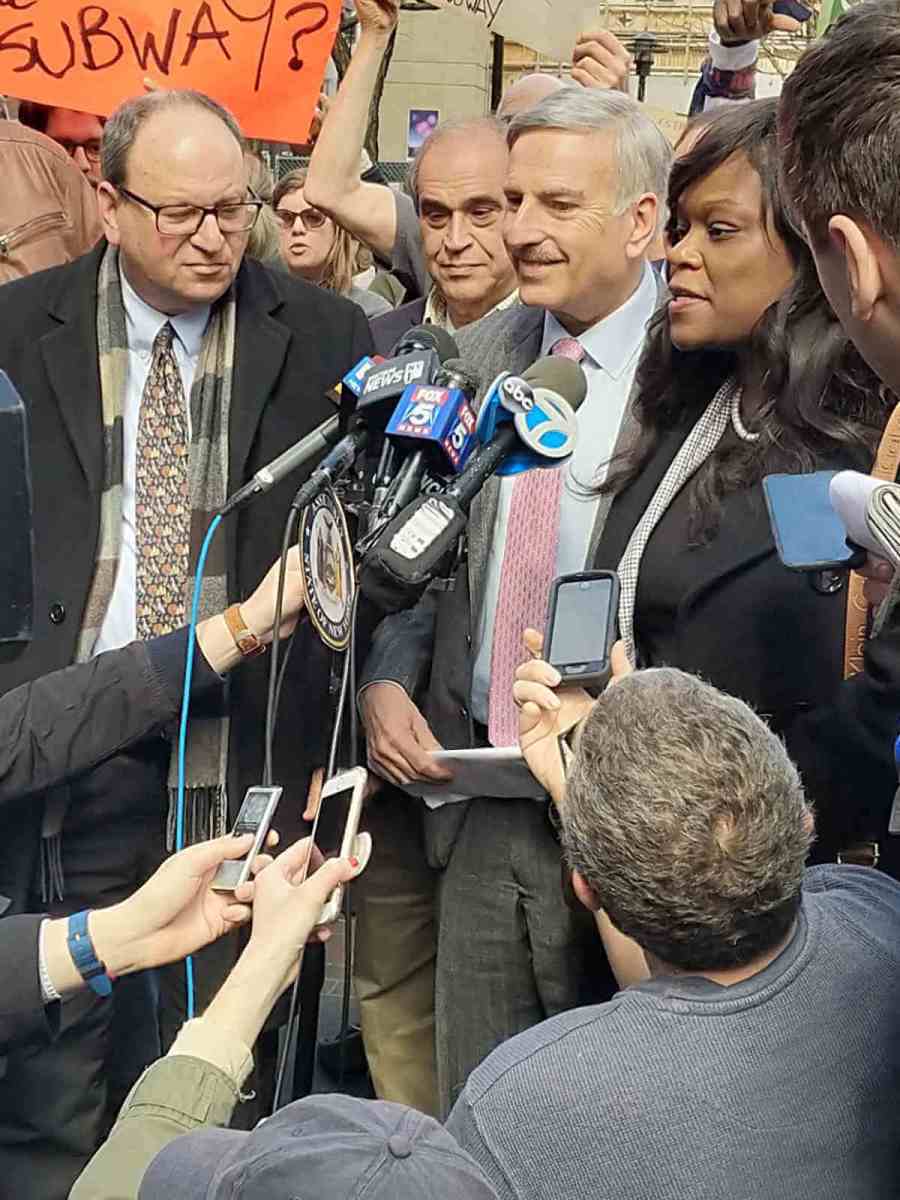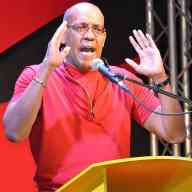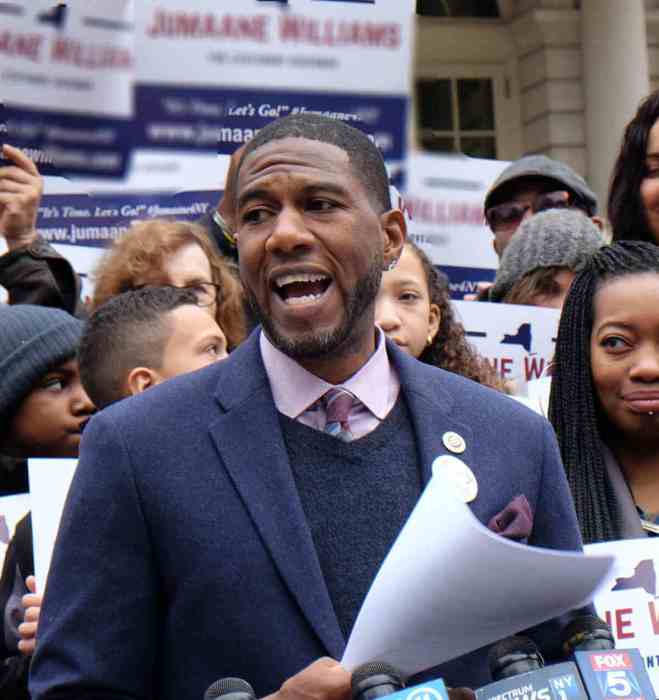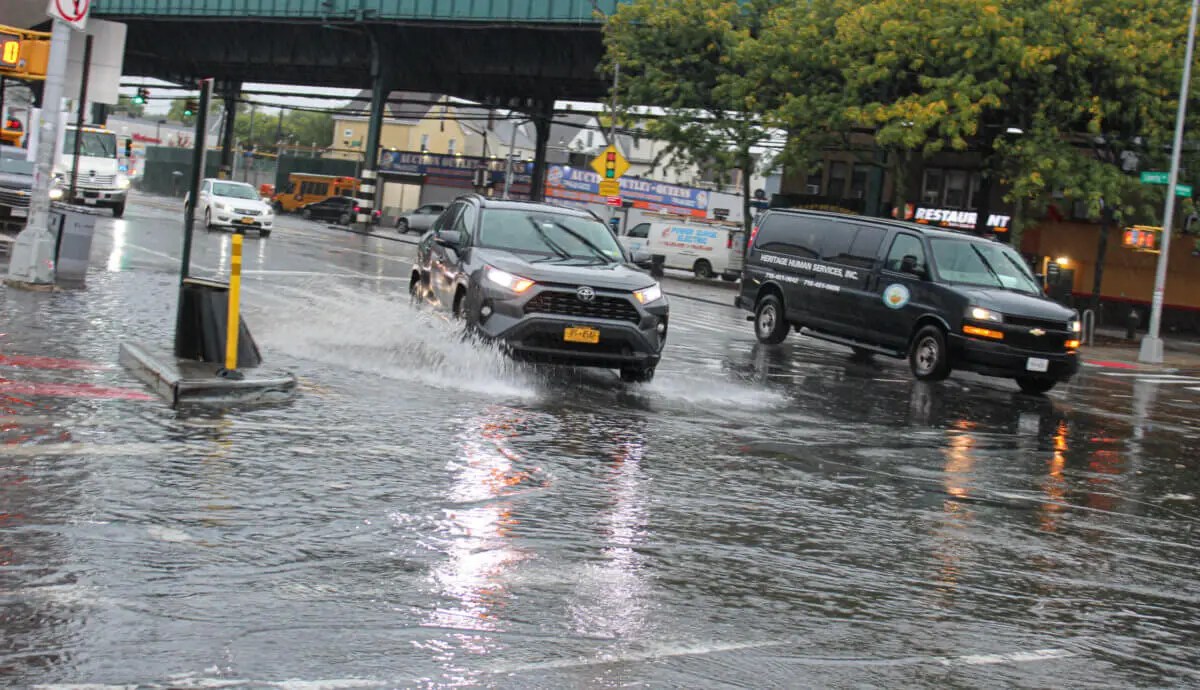Brooklyn Assembly Member Rodneyse Bichotte on Sunday joined a group of elected officials and community advocates in opposing the inclusion of congestion pricing in the New York State budget.
Democrat Bichotte, who represents the 42nd Assembly District, joined Assembly Member David Weprin, and Councilmember Barry S. Grodenchik, as well as community advocates, in opposing the inclusion, at a press conference, at Tramway Plaza, at the base of the Queensborough Bridge.
“We stand with all New Yorkers in addressing the issue of transit funding to help fix our subways and public transportation,” said Bichotte, the daughter of Haitian immigrants.
“Congestion Pricing, in its current form, will not guarantee the necessary funds to fix our transit system and will just impose another tax upon on working class New Yorkers,” she added.
“A millionaires’ tax, however, in conjunction with other sales tax revenues, and a spending cap increase can generate the necessary funding to fix our transit system for all New Yorkers,” Bichotte continued. “Let’s continue the dialogue.”
Weprin, a Democrat from Queens, who has been leading the fight against congestion pricing, said that “New York’s struggling middle class cannot afford another regressive tax in the form of a congestion pricing.
“This debate should not be rushed, and we need to look to alternatives that penalize congestion and tax the wealthiest New Yorkers,” he said. “I look forward to a healthy discussion on alternative solutions that will be fairer to all New Yorkers.”
Grodenchik noted that many parts of the city “lack accessible and efficient transportation options,” adding that residents of Eastern Queens would be “hit hardest by congestion pricing’s financial burden.
“We cannot tax our way out of a transit crisis, and writing the MTA a blank check neither addresses the agency’s longstanding underlying challenges nor sets up a sustainable solution,” he said.
But Bichotte’s Caribbean colleague, Jamaican-born Assembly Member Nick Perry, said while he does not necessarily view congestion pricing as “the panacea to funding improvements to our antiquated transit system,” he’s been hearing the concerns of his constituents and other New Yorkers about adopting this plan “to fund much-needed transit repairs.”
“My colleagues and I are currently fully engaged in discussions, and daily gaining more information, to get to a point of understanding that would allow congestion pricing to take effect in Manhattan, without negatively impacting the residents of the 58th Assembly District (which Perry represents),” Perry told Caribbean Life on Wednesday.
“I have also used the process of our discourse to encourage the MTA (Metropolitan Transit Authority) and the NYC DOT (New York City Department of Transportation) to enact community friendly bus lane policies that will address the problem of ticketing on weekends and during non-rush-hours, while still allowing buses to move freely along the dedicated routes,” he added.
As proposed, Bichotte, Weprin and Grodenchik said in a joint statement that the plan would burden New York’s middle-class families and small businesses, “who are already struggling with the rising cost of living and a competitive business climate with a new tax.”
They pointed to a recent Quinnipiac poll, which indicated that financially distressed New Yorkers are considering leaving the city, and that an additional tax on the middle class and effective tax on all goods brought into or out of New York City would be “catastrophic for outer borough communities.”
“Furthermore, the congestion pricing plan delegates unilateral authority to an unelected subsidiary of the MTA, the Triborough Bridge and Tunnel Authority (TBTA), which can set not only the tolls and increases but also the boundaries of the congestion zone as well for the purposes of funding the MTA,” the elected officials said.
They said the plan sets no benchmarks for success, such as reducing congestion, and does not guarantee congestion will be reduced at all.
“In fact, proponents admit that speeds will only increase by a negligible 1 mile per hour if congestion pricing was implemented,” said Bichotte, Weprin and Grodenchik, urging New York State to explore additional options for transit funding and “find practical solutions to reduce congestion.
“New York needs a fair deal – one that will tax those responsible for creating the congestion, and tax those with disposable income to actually reduce congestion and raise revenue for our ailing transit system,” they added.
Former Assemblyman Richard L. Brodsky said congestion pricing is “a regressive tax on middle-and low-income New Yorkers that won’t make a dent in congestion.
“The better course is to tax the billionaire’s and real estate moguls, who are left untaxed by congestion pricing and to limit the real cause of congestion, Uber and Lyft,” he said.
According to the New York Times, it could soon cost more — well over $10 — to drive into the busiest neighborhoods, from 60th Street in Midtown all the way to the Battery.
It said the fees will be part of the new congestion pricing plan that is expected to be adopted as early as April 1, the day the new state budget is due.
The fees are expected to raise billions of dollars to fix the city’s troubled subway system and thin out streets that have become strangled by traffic, according to the Times.
It said the new fees will be imposed on vehicles that enter Manhattan below 60th Street, adding that congestion fees are not expected to start until 2021, and no actual fee amounts have been decided.
A plan proposed by Gov. Andrew M. Cuomo would establish a panel of experts who would set the fees, the Times said.
It said the Triborough Bridge and Tunnel Authority, which is part of the MTA, would collect the fees.
Samuel I. Schwartz, a traffic expert known as Gridlock Sam, says drivers will likely pay $12 to $14 for cars and around $25 for trucks entering the city during peak business (and traffic) hours, and less at night and on weekends, the Times said.
It said Schwartz was on a state task force on congestion pricing that last year that recommended fees of $11.52 for cars and $25.34 for trucks.
State legislators are currently considering several possible exemptions for drivers who are low income, have disabilities or are going to medical appointments, the Times said.

























